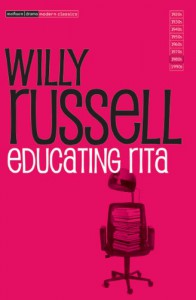A modern Pygmalion

I really did not like this play, and now that I have read Pygmalion, the play upon which this play must have been based, I dislike it even more. However, it does not run like Pygmalion: there is no bet and the play does not end unpleasantly for Rita. However, like Pygmalion, it is a play about education and how education works to empower people. It was because of this theme that my English teacher loved it because he had returned to school at a later time and become educated, and our class had also chosen to return to school and he wanted us to see how education empowers us. Personally, I would have chosen Pygmalion, but I did not know that that play existed at that time.
What I did not like about this play though are the characters. The lecturer is a drunkard and Rita walks out on her husband because she has become educated. Maybe that is an indictment on the English class system (something which we do not see as much here in Australia, but it still exists). I guess the issue with Rita and her husband was that as Rita became educated a gap between her and her husband began to develop, and as such he began to fear her orderer her that she was no longer to attend the class.
However, with me, walking out on a marriage never sits comfortably with me, and further, when it is portrayed in the media (and the theatre forms part of the media) as something normal and part of life, it simply angers me. Okay, there are many reasons as to why relationships break down, and granted Rita was probably right to walk out on hers (especially since her husband seemed to be the controlling type – or worse) but marriage breakdowns that occur because the relationship simply doesn't suit the participants any more, to me, reeks out the disposable nature of our society.
The entire play is set in the lecturer's office and the dialogue exists only between Rita and the lecturer as he teaches her English literature. Literature is wonderful because not only does it force you to think, by reading it enables you to think about the world in which we live. Obviously, being a Christian, the only book that I give any weight to is the Bible, however that does not mean that we should discard any of the other books that are widely available. However the problem is being able to sort out the rubbish from the classics. As a friend of mine once said, those of us who appreciate literature generally do not read the books that we see everybody else reading on the bus. That is a good starting point, but it does not necessarily encompass a good book. My English teacher hated Stephen King, but a lot of King's earlier works (such as Carrie, Firestarter, and Christine) I would consider literature as the character flaws and the world in which they are set speak about a lot of the prejudices that we face. While it may be desirable to melt the minds of all our enemies, such actions, in the end, generally do not solve anything.
However, I've fallen off track here, but I guess it is because there is little that I want to write about the play itself and would rather rant and rave about the difference between a classic and rubbish. I now know what my English teacher meant by 'airport trash' (while not necessarily agreeing with him). Back then he spoke of Stephen King, these days (if he is still around) he is probably ranting and raving against Harry Potter and the Girl With a Dragon Tattoo.


